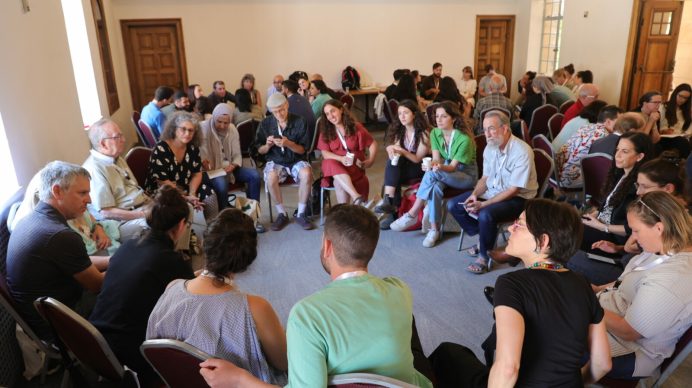Avi Meyerstein is the founder and president of the Alliance for Middle East Peace (ALLMEP).
Should we talk about the Israeli-Palestinian conflict at school? At work? At our city council? In our community, synagogue, mosque, or church? At the family dinner table? Should we put out a statement about the war? Bring in a speaker? What do we say? What can we do? Across the globe, and especially among communities most touched by the horrific violence of this war, these questions have been very real in recent months. Angry and traumatised people are bringing a war to work, to school, and even to sporting events. People feel victimised, threatened, and scared like never before. They complain that their pain is unseen, that no one is supporting them.
There is much to consider and a lot at stake. No one wants their community, team, or workplace to break down, or for people to feel alienated. More positively, when we see pain in our extended ‘family,’ we want to be able to support each other through difficult times and tragedy.
Public statements present a complex decision. The pressure to speak out can be very real. But, even the most careful messaging can fall flat amidst such a broken public conversation. Many groups are remaining silent unless their community members or stakeholders are so closely tied to this issue that they have no choice.
Internal communications are a different matter, though. People are really struggling, both as individuals and in relating to each other. Providing your community with thoughtful tools for learning, looking out for each other, having successful conversations, and taking joint action to help those in need can help everyone cope during a stressful and horrific time.
At ALLMEP, we do this every day. We have to. Our team, and the hundreds of colleagues in our network, includes both Palestinians and Israelis. We can’t avoid the conflict; our job is to tackle it head on. Despite immense challenges, we work to help Israelis and Palestinians engage with each other, carefully build relationships and trust, and take the most difficult steps toward peace.
So, how can you navigate this mess?
First, you can set an internal framework and tone
Emphasise how much everyone is affected by this crisis on a human level and how much you care about each other. Recognise that many may be in pain, whether from personal connections or from seeing so much violence in such a special part of the world.
Encourage people to check in on each other personally. Reassure everyone that they’re not alone, that many of us are struggling with this. Remind everyone of your shared mission, concern, values, and responsibility for one another. This is not a zero-sum, win-lose situation, certainly not inside your community or company.
Identify and share resources that are available to support your people, too. This may mean recirculating your core values that commit to ensuring respectful conduct and honouring diverse opinions. Perhaps you can even arrange for or direct stakeholders to emotional support resources in your community. At ALLMEP, we regularly share resources related to these issues.
Second, you can bring in voices that model constructive approaches
This can be as simple as sharing a thoughtful article or video where Israeli and Palestinian peacebuilders talk about their pain, experiences, and joint efforts to respond to this crisis. For large audiences, you may even be able to bring in a peacebuilder for a live conversation.
For peacebuilders on the ground in Israel and Palestine, their main job right now is to hold up their communities. They’re doing everything possible to help people and to save lives, from providing food, medicine, and shelter to delivering childcare and trauma care. They’re working together, often after losing family and friends, to prevent even more violence.
For the rest of us, part of our jobs must be to tell their stories. Spread the good word. The more people who know about their work, the more impact they have on the public conversation. It shows people an alternative to violence and even a pathway for eventual peace. It also helps to lower the temperature and prevent spillover conflict in our own communities.
Third, consider promoting joint action
When talking is too hard, sometimes you can simply do some good together. Beyond amplifying constructive voices, you can make a real difference financially. Help direct donations to respected relief and peacebuilding efforts through community, church, or corporate gifts. Circulate lists of charities, and consider offering matching gifts, to encourage individual giving. Recruit community members to sign a multi-year pledge to meet the needs that are, and will be, so immense in the years ahead.
Fourth, you can provide your stakeholders with some basic tools for having more successful conversations themselves
If they choose to talk, give them the best shot of walking away feeling heard, empowered, respected, and even more united. This is not easy or foolproof, and it’s not for everyone. How it goes depends on the individuals involved, the culture and support around them, and the tools they’ve been given. Sharing this cheat sheet might help.
None of this is easy. But by supporting each other and voices for peace in our communities and our workplaces, we can get through it together. And we can even help Israelis and Palestinians working together on the ground to make sure we never find ourselves in such a horrific moment again.




































